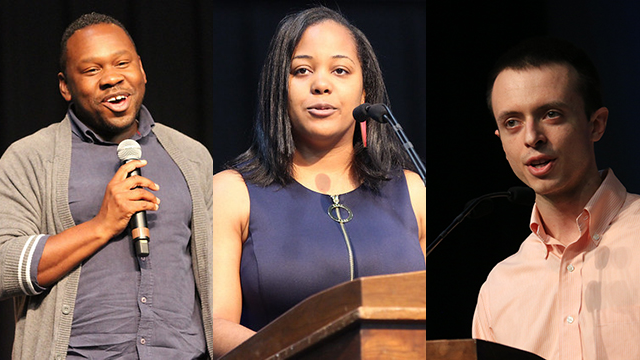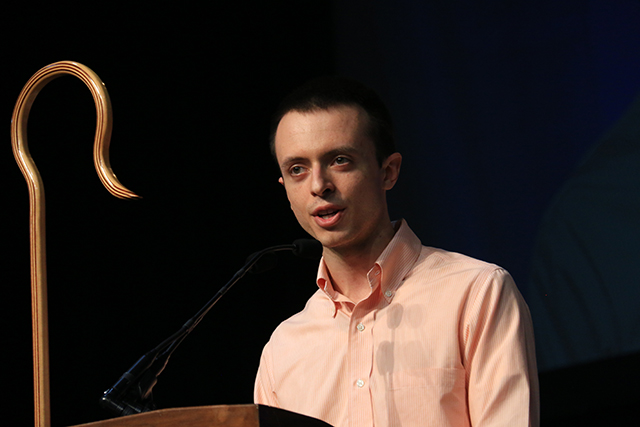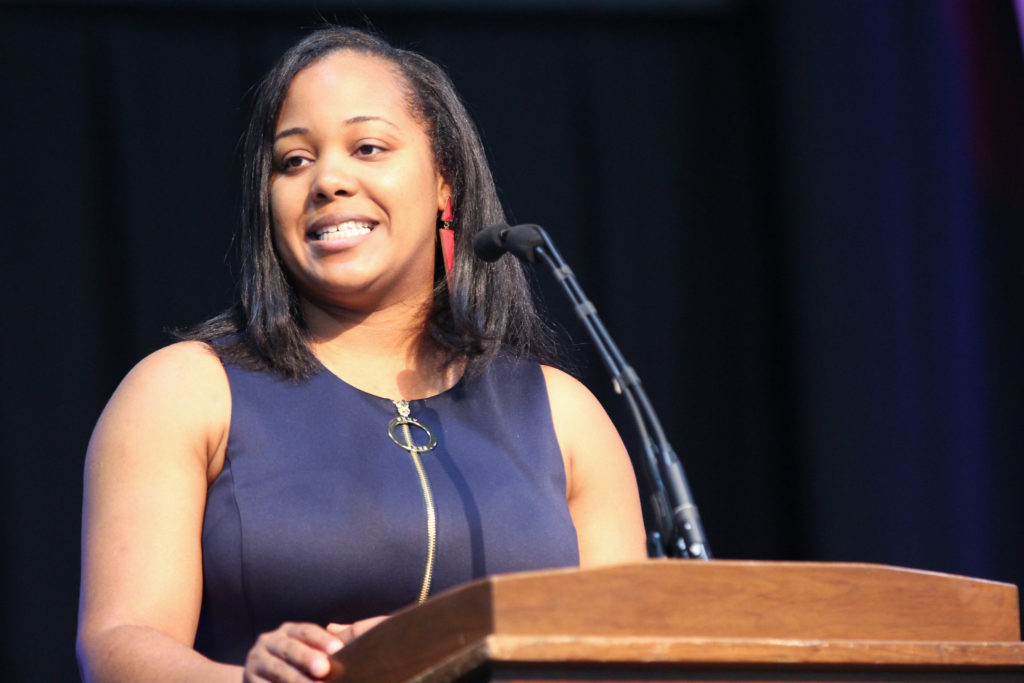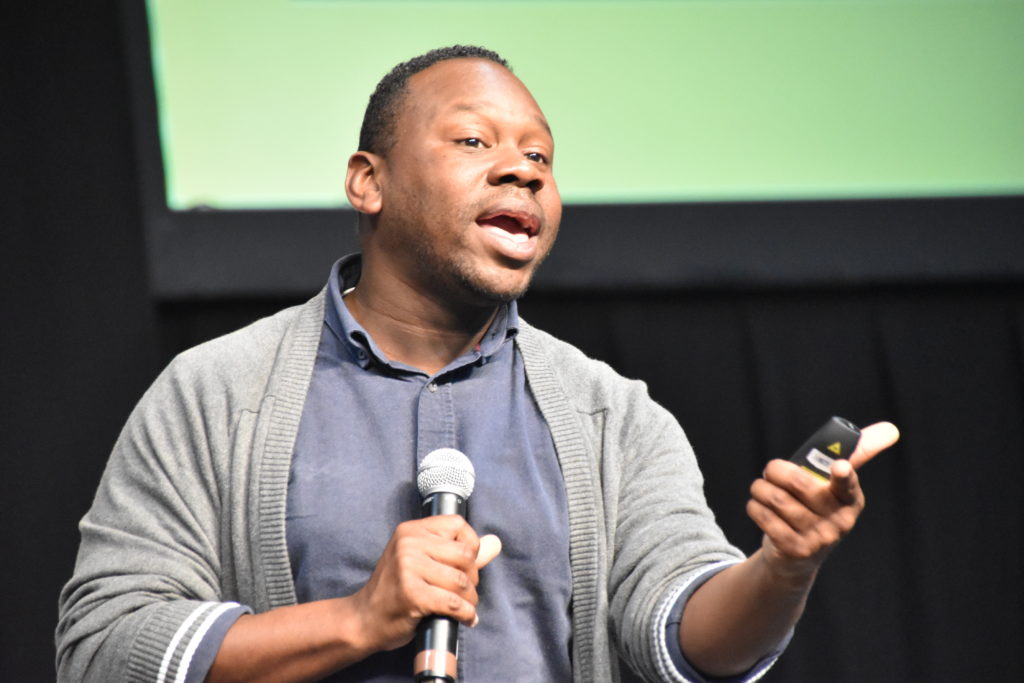
By John W. Coleman
Three young adult speakers featured at the Eastern PA Annual Conference, June 13-15, evoked its theme, “Tell to the Coming Generation” (from Psalm 78), by telling their older peers what the younger, “coming generation” needs to hear.
Krystl Johnson, a young, seasoned leader of youth and adults at St. Daniel’s UMC Chester and a returning delegate to General Conference, spoke first at the annual Laity Session June 13, that preceded the start of the annual session.
Samuel Longmire, youth minister at First UMC Lancaster, spoke on stage during the opening worship, while other young adult voices were heard via video recordings.
And campus minister Derrick Laruth Scott III provided a powerful, 90-minute teaching session the next morning, June 14. He is Executive Director of the Campus to City Wesley Foundation (CCW), serving college-aged young adults on three campuses in Northeast Florida.
The three millennials (the generation born 1981-1996) each work closely with post-millennial youth and/or young adults, engaging them in relationships and diverse ministries, through which to reach, listen and speak into their lives. They advised their listeners to do likewise.
Each speaker suggested what young people need and want to hear. They urged conference members to provide honest, compassionate, intentional guidance that patiently meets young adults where they are and helps them grow to where Christ wants them to be.

Samuel Longmire
Longmire emphasized the impact such guidance can have when it comes through intergenerational relationships. He recalled learning that as a sophomore at Lancaster Bible College, when a retired minister engaged him in a chat over lunch in the school dining hall.
The college allowed such non-staff retirees to hang out there to listen and talk to, pray with and befriend young students. Their hope was to “personally invest in the daily lives of students in whatever ways they could,” offering guidance and moral support.
Longmire’s encounter with “Jim” did lead to a trusted friendship, in which the mentor impacted the young student with “his deep love for God and contagious passion for the gospel.” Longmire learned from Jim how to develop and witness to his faith among others on campus and in the community.
“Jim was the one who motivated me to seek and walk with God,” Longmire recalled, “not because of some specific thing he said that stuck with me but because of the overall testimony of his life: a testimony that pointed straight to God…”
The youth pastor concluded from his and other testimonies that “intergenerational ministry is most effective within intentional, personal relationships,” in which older generations can “tell the coming generation” about God through “the testimony of their lives and …the ways that they have seen God work.”
He recommended, for example “marriage mentoring” that pairs “older, godly married couples” with young newlyweds for guidance.
The division of young and older adults in separate age-level ministries is “a deterrent to substantial, genuine relationships between generations,” Longmire explained. He called for more informal relationships and intergenerational ministries “so that testimonies of God can easily move from generation to generation.”

Krystl Johnson
Krystl Johnson titled her Pentecost-themed Laity Session address “The FAQs (as in Frequently Avoided Questions): A Millennial Update.”
“The church hates us! Why does it hate us?” she asked on behalf of young people. She is St. Daniel’s UMC’s youth ministry coordinator and also chairs its Administrative Council. “I have stopped counting the meetings I’ve attended where young people are trampled for not being present and not being pleasant….That clanging chorus of complaints is the sound of a church that is running and hiding from its responsibility to tell, teach or show the coming generation anything.”
Johnson is Executive Director of the Delaware County Pregnancy Center in Chester. She also serves on the UMC’s General Board of Higher Education and Ministry. She represented the conference as a delegate to the 2016 General and Jurisdictional conferences and will do so again in 2020.
“When we override the coming generation’s advocacy interests by ignoring the social and economic injustices within our own conference and communities, or by failing to take up platforms to challenge them, we are running and hiding,” she told the assembled laity. “When we choose not to mentor and train up our young people because ‘he’ doesn’t do anything without earphones around his neck and ‘she’ is always twerkin’, tweetin’, or talkin’ on her phone, we are running and hiding.”
Johnson called on her audience to “maintain personal and spiritual accountability for the actions, behavior and mindsets of our younger brothers and sisters in Christ.
“The next generation is supposed to bring regeneration. Yet, the church is still dying. We have become our own silent killer,” she asserted. “The church is not holding people accountable for their actions, and it has failed to practice Christian correction. When I think of what causes silent killers like drug addiction, HIV, and human trafficking to run rampant in our communities, it is because people choose to be hush hush, when they could be helping and holding people accountable to their available resources, rights, and responsibilities. We can’t run and hide from the truth.”
A doctoral student at Evangelical Seminary in Myerstown, Johnson cited Psalm 78 as a call to the church to “assert its Biblical authority and accountability” and to “love its young people enough to speak to their unruliness and unfaithful hearts.”
She said the coming generation wants a church that provides them with community and acceptance for who they are, as well as opportunities to serve and change the world. “But they also need a church that will challenge them to be more than what they are… to grow into the people the Lord wants them to be.”
Cautioning her listeners that young people today often don’t answer phone calls and prefer text messages and tweets with visual emojis, memes, snaps and gifs, Johnson said, “Our young people can go an entire day communicating without ever using anything we, as an older generation, would recognize to be a real word.” Still, she said, we should proclaim the gospel with our lives, manifesting the popular adage, “Preach the gospel at all times, and when necessary, use words.”

Derrick Scott
Derrick Scott, in his teaching session, focused less on telling the coming generation and more on listening to help them discern and respond to their life mission. He has directed the Florida Conference’s Campus to City ministry for eight years, serving students at the University of North Florida, Jacksonville University and Flagler College. Previously, he directed collegiate ministries and music at CrossRoad UMC, a small but vibrant church in Jacksonville.
Scott shared stories and insights about some of the young people he has engaged in his work, helping them to hear God’s voice, identify their life quests and gradually step into ministry leadership roles, including seminary for some. He used various scriptures to reflect their need for relevant biblical and spiritual interpretation to understand the Christian faith and how it can relate meaningfully to their lives.
“Who’s going after them?” he asked. “We need to be the church that’s willing to go after them and sit with them as they discern their call.”
However, he cautioned listeners about the growing trend of public denominational conflicts, exclusionary policies and talk of schism that can turn many young people away from the church. “They may not be in your churches, but they are watching what you say and do….What we do as the church, the way we are, how we handle our differences do affect the next generation.”
Scott emphasized the importance of being available, patient, imaginative and flexible to communicate with young adults on their own terms. That can mean lots of candid chats in cafés and bars, he said, asking questions like, “How is it with your soul?” and “What’s the last thing you heard God say to you?”
Reaching the next generation “can take a lot of time and energy…and more than a 10-hour-a-week part-time staff,” he said, quoting Florida Area Bishop Kenneth Carter: “We need to overinvest in the next generation.”
Active in young adult ministry for 17 years, Scott said being serious about such ministry requires a willingness to change how we do things and why. Yet, he said, “I can’t tell you how many times a young person has told me, ‘I need someone older to sit with me…and tell me the history of the church.”
NOTE:
Annual Conference recordings of two featured young adult speakers’ presentations, which were video livestreamed, may be viewed on the conference website’s Annual Conference 2019 page. Samuel Longmire’s speech is in video segment #1 at 16:47. Derrick Scott’s presentation is in video segments #10 and #11. Longmire’s speech and Krystl Johnson’s Laity Session speech, which was not video livestreamed or recorded, may both be read on the Annual Conference 2019 page.
Additionally, you can also read Krystl Johnson’s speech, “Re-envisioning the Global Church,” presented to the Wesleyan Covenant Association Northeastern Regional Meeting, May 11, 2019, at Washington Crossing UMC. Find it in our website’s From Pulpit & Pew blog session.
